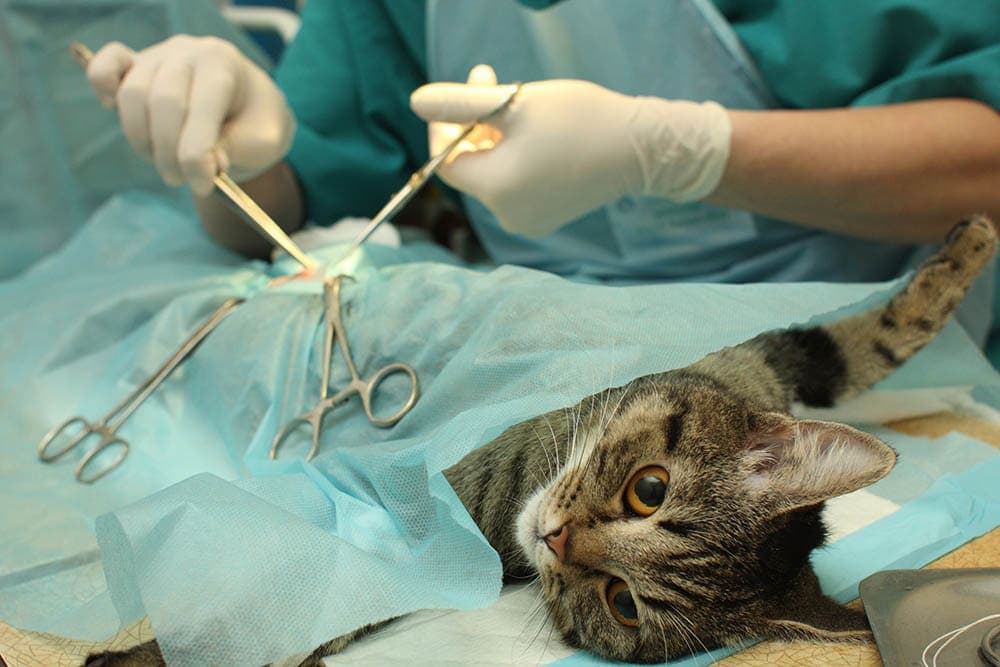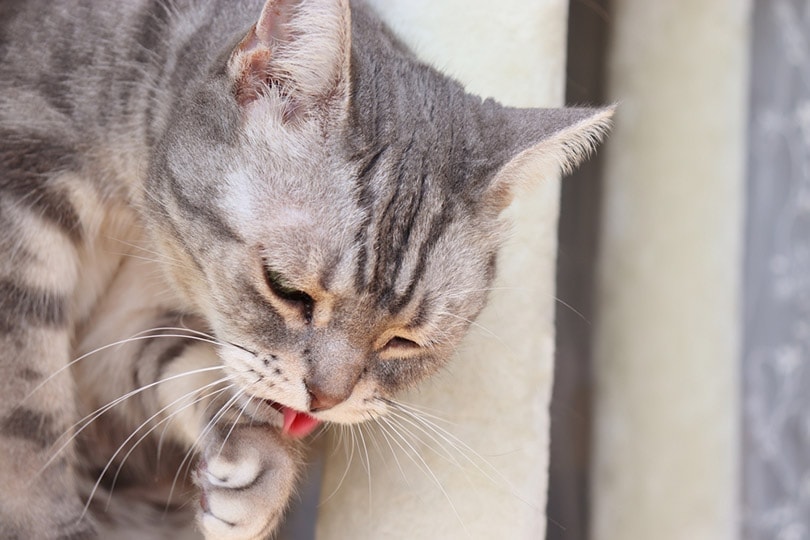6 Common Ferret Health Problems to Watch For (Vet Answer)

Updated on

Ferrets are lovable and curious creatures. Although they aren’t quite as popular as dogs or cats, ferrets are quite beloved by their families. If you’re considering ferret ownership, you’re probably looking to see what kinds of health issues you can expect for your ferret.
Let’s examine some common health conditions affecting ferrets and what treatment options exist.
The 6 Common Ferret Health Problems
1. Adrenal Gland Disease
Ferrets can develop adrenal gland disease, also known as hyperadrenocorticism. The small adrenal glands, located close to the kidneys, secrete certain hormones. In ferrets, they secrete larger amounts of sex hormones than normal. Your ferret may show signs of sexual activity, even if spayed or neutered.
Your ferret may show signs that vary, but here are some you want to be aware of:
- An enlarged vulva
- Increased aggression
- Mounting behaviors
- Excessive grooming
One of the hallmark signs of adrenal disease in ferrets is hair loss that starts at the base of the tail and even runs up the back.
Diagnosing adrenal disease in ferrets can be challenging because it can be difficult to image the adrenal glands on ultrasound. That said, if your ferret presents with a combination of these signs, your vet will likely diagnose them with hyperadrenocorticism.
Your vet may recommend surgery to treat adrenal disease, but many try medication. Two major options are Lupron (leuprolide acetate) and melatonin.

2. Dental Disease
Ferrets can develop a variety of oral health issues. First and foremost, they will readily build plaque and eventually calculus. Gingivitis is common.
Ferrets like to explore the world with their mouths. As such, they may fracture teeth, especially the canine teeth. They can also receive traumatic injuries like lacerations from chewing on inappropriate “toys”.
Your veterinarian will start with an oral exam, but they’ll need to anesthetize your ferret to fully evaluate their mouth, perform dental scaling to remove tartar, and treat diseased teeth or mouth wounds. Treatment depends on what is wrong. Your ferret might need surgical extractions of affected teeth, antibiotics, or anti-inflammatory medications.
To help prevent dental disease, you’ll need to brush your ferret’s teeth regularly. One recommendation is to use a cotton swab to act as a toothbrush. Use a pet-safe toothpaste.
3. Insulinoma
An insulinoma is linked to low blood sugar in your ferret or hypoglycemia. An insulinoma is a benign tumor that affects the pancreas. Because an insulinoma causes hypoglycemia, you’ll see signs such as the following:
- Weakness or collapse
- Drooling
- Vocalizations
- Wobbly gait
- Seizures
Your veterinarian will need to perform blood work to diagnose an insulinoma, as well as potentially an abdominal ultrasound.
Treatment ranges from surgery to medication. Most veterinarians will start with conservative management of these cases. You’ll often need to feed more frequently, and your vet may prescribe steroids to increase your ferret’s appetite.
Some ferrets have both adrenal gland disease and an insulinoma, which can make treatment quite complicated.

4. Lymphoma
Lymphoma is the most common ferret cancer, and it can affect pretty much all body systems, from the gut to the heart. The signs your ferret exhibits typically relate to where the cancer occurs. Common signs include:
- Weight loss
- Vomiting
- Visible masses and ones you can feel
- Lymph node enlargement
While ferrets can be entirely without signs for months, it can also affect them hard and fast. Usually, older ferrets do well for a while, but younger ferrets typically have a shorter survival time when diagnosed.
Your veterinarian will usually submit samples to test affected lymph nodes or masses, but your veterinarian can detect some changes in blood work. X-rays and ultrasound are also helpful diagnostic tools when diagnosing and treating lymphoma in ferrets.
Chemotherapy is the ideal treatment for lymphoma, but it usually only sends it into remission. Your veterinarian or oncologist will help you decide on the best course of therapy. Other treatments include steroids and nutritional support.
5. Foreign Bodies
Ferrets love to explore, and they will explore with their mouths. It’s very common for ferrets to eat things they are not supposed to, which can be pretty dangerous. Some objects will cause intestinal obstructions, but others can also perforate their gut.
Younger ferrets more commonly eat foreign bodies, but it’s possible for ferrets of any age. You should supervise your ferret when they’re out and about and keep objects like foam and rubber safely put away. Even thread or yarn is a danger.
While foreign bodies can sometimes be diagnosed if you see your ferret eat an item, usually, it’s harder to determine. If your ferret is vomiting or uninterested in food, your vet should evaluate them. Your vet will usually recommend diagnostic imaging.
Most ferrets with foreign body ingestion need exploratory surgery to remove the object. As part of the surgery, your vet may remove unhealthy gut sections. Your ferret will need post-operative care, including pain medication and possibly antibiotics.

6. Heart Disease
Unfortunately, ferrets are at risk of developing heart disease, particularly dilated cardiomyopathy. Heart changes, such as heart enlargement, can lead to heart failure.
Your veterinarian may auscultate a heart murmur or arrhythmia when they listen to your ferret’s heart, but you might also see potential signs of heart disease at home, including:
- Trouble breathing
- Weakness
- Wobbly gait
- Lethargy
- Coughing
Your veterinarian will generally want to look at several diagnostic tests when evaluating your ferret to determine what type of treatment is needed, such as:
- X-rays (radiographs)
- Electrocardiogram (EKG)
- Echocardiogram (Echo)
Most cases of heart disease cannot be reversed. Treatment aims to improve cardiac function and decrease clinical signs such as coughing.
Frequently Asked Questions (FAQs)
What are the signs of a ferret being sick?
Sick ferrets can display a range of signs. The most common gastrointestinal signs include vomiting or diarrhea, but a sick ferret could also have a decreased appetite. Your ferret might become increasingly lethargic if it’s a slowly progressing illness, but a rapid onset of illness can also cause your ferret to be mopey or unresponsive.
Ferrets with cardiac or respiratory illness may cough, have a rapid respiratory rate, or even have pale or bluish gums. Your ferret may show behavioral changes if they’re ill or painful. They may also have weight loss.
Contact your vet if you notice any changes in your ferret so that your ferret can get a prompt diagnosis and start treatment.

What does a dehydrated ferret look like?
A dehydrated ferret will have sticky or tacky gums. They won’t be pink and moist like they should generally be. They might even be dry to the touch.
If your ferret tolerates checking a capillary refill time, you could look at that. Normal for animals is less than 2 seconds. You gently press on the gums until they blanch and go from pink to pale. Release the pressure and count how many seconds until the color comes back.
Dehydrated ferrets may have a delayed skin tent, which means if you lift their scruff, it stays up longer than average. They may also have sunken eyes if they’re very dehydrated.
Conclusion
Ferrets are delightful critters that bring joy to their families, but they are at risk for certain health conditions. If you notice your ferret acting differently or having abnormal signs, it’s essential to contact your veterinarian right away.
Featured Image Credit: Irina Vasilevskaia, Shutterstock











